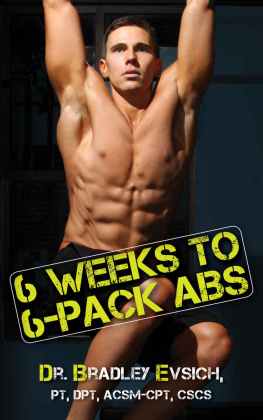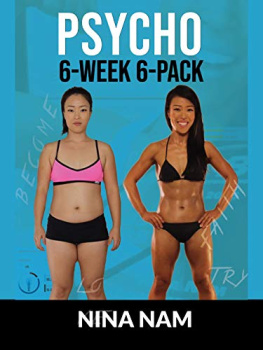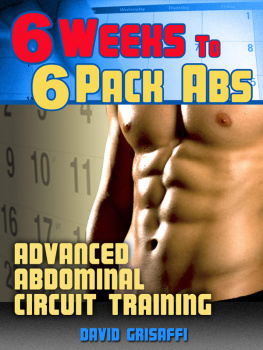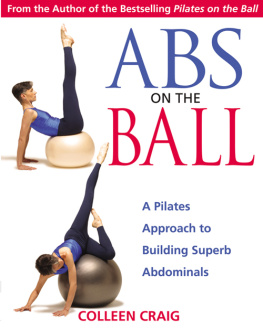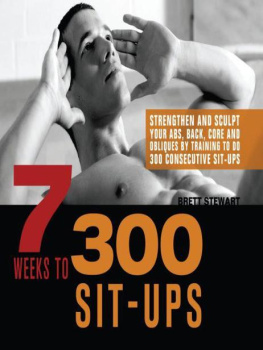6 Weeks to 6-Pack Abs
Dr. Bradley Evsich, PT, DPT, ACSM-CPT, CSCS, FNS

Palmetto Publishing Group
www.PalmettoPublishingGroup.com
Copyright 2015 Dr. Bradley Evsich, PT, DPT, ACSM-CPT, CSCS, FNS
All rights reserved.
Cover Photo by: Tyson Arts at
Instructional Photos & Author Photo by: John Mitchell of BBPics.com
Contents
eBook Legal Disclaimer
The advice of a medical professional should be sought before participating in any physical activity or exercise program. If you participate in physical exercise or training activities outlined in this eBook, you do so entirely at your own risk. The author and publisher shall in no event be held liable to any party for any direct, indirect, punitive, special, incidental or other consequential damages arising directly or indirectly from any use of this material, which is provided "as is", and without warranties.
Physical exercise can be strenuous and subject to risk of serious injury (including but not limited to musculoskeletal injury, spinal injuries, abnormal blood pressure responses, and rare instances heart attack or death). It is urged that you obtain physical examination from a doctor before using any exercise equipment or participating in any exercise activity. Any recommendation for changes in diet including the use of food supplements, weight reduction and/or body building enhancement products are your responsibility and you should consult a physician prior to undergoing any dietary or food supplement changes.
The author and publisher of this eBook and the accompanying materials have used their best efforts in preparing this eBook. The author and publisher make no representation or warranties with respect to the accuracy, applicability, fitness, or completeness of the contents of this eBook. The information contained in this eBook is strictly for educational purposes. Therefore, if you wish to apply ideas contained in this eBook, you are taking full responsibility for your actions. The author and publisher disclaim any warranties (express or implied), merchantability, or fitness for any particular purpose. No part of this eBook may be copied, shared, or changed in any format, sold, or used in any way under any circumstances.
Chapter One:
Anatomy and Function of the Mid-section
The mid-section and core of one's body can be divided into muscle groups; the rectus abdominus, the obliques, and the transversus abdominus. The most superficial areas are the rectus abdominus and the obliques (the areas we can see) while the transversus abdominus is a deeper muscle that lies beneath.
The rectus abdominus is the one everyone is most familiar with, it creates the "6-pack" abs. The rectus abdominus runs from the bottom of your sternum and inner portions of ribs 5-7 all the way down to the pelvis at the pubic crest/symphysis. This muscle helps to flex the trunk (bend the spine down and forward in a crunching motion). It can also be "divided" into the upper and lower abdominals. The upper abdominals are near the sternum and aid in bringing the sternum/ribs closer to your pelvis. The lower abdominals are near the pelvis and aid in bringing the pelvis closer to the sternum/ribs. While training the rectus abdominus, you will engage the upper and lower abdominals no matter what but certain exercises can emphasis these portions of the core.
The obliques can be separated into the interior and external obliques. The external obliques run from the front portions of your lower ribs down to the top side of the pelvis (iliac crest) while the internal obliques run from the same areas but lie underneath. The external obliques have fibers that run in the same direction as placing your hands into your pockets while the internal obliques have fibers running in the opposite direction underneath. Both muscles aid in rotation and side bending of the trunk.
The transversus abdominus is the deepest of the core muscles. It acts as a corset around the spine, helping to pull the abdominal wall closer to the spine for stabilization. This muscle is very important in keeping the vertebral column in-line and keeps the core "tight". It also helps develop the "V" lines near the waist line.
In these workouts, you will be working ALL of these muscles together to fully strengthen, develop, and define your mid-section!

Chapter Two:
Explanation of the Workout
There will be 2 different workout selections that will be used totaling 8 exercises for the entire program (8 of my favorite abdominal exercises).
Each workout will include 1 upper abdominal, 1 lower abdominal, 1 oblique, and 1 transversus abdominus exercise for a total of 4 exercises per session.
You will perform 3 abdominal sessions per week, with at least 1 day off between sessions. You can perform them at the end of your workout or as a workout of their own.
Each session will have the same exercises BUT the number of reps, rest periods, and sequences of exercises will be different to keep challenging your abdominals and eliminating a plateau.
There will be 3 phases to this program, each 2 weeks in length for a total of 6 weeks:
- Weeks 1&2 will be the Strength phase, where we will try to strengthen the abdominals to allow you to lift more weight in the future phases. The reps here will be 8-10.
- Weeks 3&4 will be the Hypertrophy phase, where we will try to build up the density and size of the abdominal blocks. The reps here will be 12-15.
- Weeks 5&6 will be the Definition phase, where we will try to etch in detail to the abdominals and obliques. The reps here will be 20-25.
The first session of each phase will have you performing each exercise with 60 seconds rest between sets and 120 seconds rest between exercises. (Here you will perform all the sets for the lower abdominals, then all the sets for obliques, then all the sets for upper abdominals, etc.)
The second session of each phase will have you performing each exercise with 30 seconds rest between sets and 60 seconds rest between exercises. (Here you will perform all the sets for the lower abdominals, then all the sets for obliques, then all the sets for upper abdominals, etc.)
The third session of each phase will have you perform the exercises in a circuit fashion, performing one set of each exercise right after the other and resting 60 seconds between rounds. (Here you will perform 1 set for lower abs, 1 set for obliques, 1 set for upper abs then rest before repeating.)
During each phase, you will try to reach failure at each rep range. If you are supposed to do 8-10 reps, choose a weight or angle that will challenge you and ONLY allow you to perform 8-10 reps with proper form. This is very important. Make note of the weight and angle you used in each session so you can match the weight/angle and try to perform more reps or increase the weight/angle and try to perform the same reps during the next session (this is called progressive overload and forces the muscle to adapt by growing which is what we want!).
The exercises will be explained in the following pages. If you need more information about the exercises, visit
Next page


